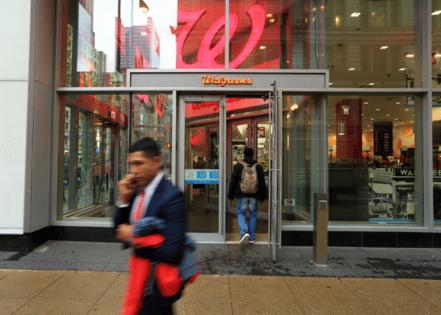Walgreens, grappling with continued financial losses, lays out plan to shutter 1,200 drugstores
Published in Business News
Walgreens Boots Alliance plans to close 1,200 of its stores over the next three years, as it grapples with continued financial losses, the company announced Tuesday.
About 500 of those stores will close in fiscal year 2025. The Deerfield, Illinois-based company now has more than 8,000 U.S. stores, meaning it plans to close about 14% of its locations.
Walgreens CEO Tim Wentworth said in an earnings call Tuesday morning that about 6,000 of those current stores are profitable.
“While the decision to close a store is never an easy one, we feel confident in our ability to continue to serve our customers,” Wentworth said on the call.
The store closures will give Walgreens a “healthier store base” that will help it respond better to shifts in consumer behavior and buying preferences, Wentworth said. “Our ability to respond to a changing environment needs to improve,” he said.
He said Walgreens plans to “redeploy” most of the workers in those stores and invest in remaining stores.
Many of the stores slated to close next year will shutter in the second half of Walgreens’ fiscal year, said Manmohan Mahajan, executive vice president and global chief financial officer, during the call. He said Walgreens plans to focus on closing stores where it owns the locations or where leases are set to expire in the next few years.
Wentworth had warned earlier this year that Walgreens planned to close “a significant portion” of its underperforming stores over the next three years. Walgreens already had plans to close about 300 stores. A Walgreens spokesman could not provide details Tuesday about which stores would close.
Wentworth said Tuesday the company also plans to reorient, to focus more on its historic work as a retail pharmacy-led organization. He said the company will be more selective with which national product brands it carries, and expand its own brands in its stores.
The changes, including the store closures, should help improve Walgreens’ earnings over time, said John Boylan, a senior equity analyst for Edward Jones, in a note to investors Tuesday. “However, these are likely early steps in what could be a longer journey and is not without risk,” Boylan wrote.
It’s possible the store closures could also further open the door for online competitors, such as Amazon Pharmacy, which announced last week that it plans to more than double the number of cities next year where patients can get same-day delivery of medications, said Rajiv Leventhal, a senior analyst for digital health at EMARKETER, a market research organization.
“That’s a significant amount (of closures) and I think it’s going to pave the way for some other players to capture some of that market,” he said.
In recent years, Walgreens has struggled with losses as it worked to become more of a health care destination, and as it has faced competition from CVS Health, Walmart and Amazon. It’s also grappled with challenges related to medication reimbursements.
Between June 1 and the end of August, the company had an operating loss of $978 million compared with $450 million during the same quarter last year.
The company has conducted several rounds of layoffs, eliminating more than 1,000 jobs over the last few years, including many in Illinois. It’s also been working to cut costs, and exceeded its goal of cutting $1 billion in costs last fiscal year, following years of similar measures.
Walgreens had also invested billions in Chicago-based VillageMD, which provides primary care, under Walgreens’ previous CEO Rosalind Brewer. At one point, Walgreens had planned to attach Village Medical clinics to 1,000 of its stores by 2027. But Wentworth, who took over as CEO a year ago, said in March that Walgreens had recorded a $5.8 billion impairment charge related to VillageMD, and that VillageMD would be closing 160 clinics. Walgreens said in August, in a filing with the Securities and Exchange Commission, that it was considering selling all or part of its VillageMD business.
Competitor Walmart has also pulled back on its efforts to become a health care provider, announcing in April that it was closing its Walmart Health centers, saying in a news release it was “not a sustainable business model for us.” CVS Health, meanwhile, said this summer it planned to open 25 Oak Street Health clinics in its stores. Oak Street Health provides primary care for people on Medicare, focusing on low- to moderate-income seniors in underserved communities.
©2024 Chicago Tribune. Visit at chicagotribune.com. Distributed by Tribune Content Agency, LLC.












Comments